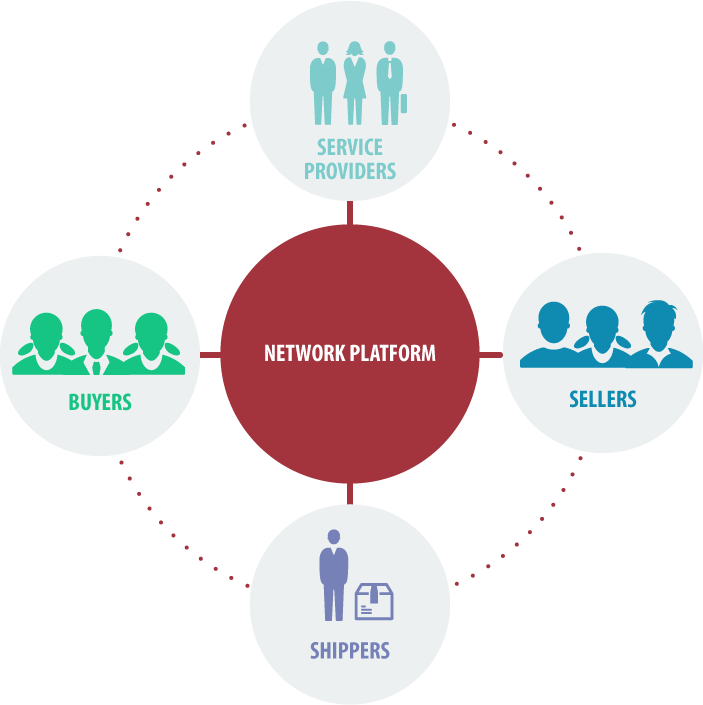This post has already been read 38353 times!
Network Marketplace Platforms are driving disruptive innovation in business across every industry today. The reason is simple.
Network platforms eliminate many inefficient layers of middlemen that complicate business relationships, slow down transactions and raise total costs. Instead, they connect buyers, sellers, and service providers directly which streamlines business interactions, simplifies the supporting systems landscape, and drastically reduces the total cost to serve the end customer. In addition, these platforms invest in enhancing the user experience and removing friction to conducting business easy and on-demand.

Companies such as Uber, Lyft, AirBnB, etc., all leverage such platforms and in the process they deliver remarkable value.
However, almost all of these prominent examples are private networks built on private platforms that are owned, operated and controlled by a single company. There are several cloud based commercially available platforms from Platform-as-a-Service (PaaS) providers but they are designed to support traditional single party applications rather than marketplaces. In this post, I identify five key characteristics that define a new breed of platforms that I call “Network Platforms,” features that provide significant advantages over the alternatives.
1. Multi-Party
Traditional software, such as Enterprise Resource Planning (ERP), is designed to function within an enterprise. As such it does a good job and provides value.
However, in today’s world where business is global and many functions are outsourced, enterprise-centric software is an obstacle. Complicated and costly integrations need to be made to share data, and this data is often stale. .
Multi-party solutions are designed from the ground up to incorporate all trading partners on a single platform with a single version of the truth. Permissions frameworks ensure data is shared across relevant trading partners only where required.
2. Real Time
Network Platforms are real time, there are no delays and thus no stale data. Data, events, states and transactions occur in real time as opposed being processed in periodic batches. This is significant because it enables intelligent decisions to be made during execution based on the current situation. Planning incorporates real time execution data for more precise and practical plans, while execution is informed by planning.
3. Frictionless Business
Never underestimate the value of convenience. A major reason why consumers are flocking to network platforms like AirBnB and Uber is precisely because of the convenience, ease of use and speed of booking a car or a room.
Research has also shown that the easier it is to buy, the more consumers will buy. Amazon has exploited this to powerful effect with “Buy in 1-Click” buttons and by suggesting related products with “Customers Also Bought…”
Because Network Platforms are multi-party and real time, much of the friction to doing business is removed, and companies can transact faster and cheaper than ever before.
4. Agile
A lot is said about the value of being agile in business. But the truth is, you can only be as agile as the slowest member in your product or service delivery network. It does little good if you are agile but the critical links in your delivery network are cumbersome.
Since all trading partners are on a single, real time network, Network Platforms enable agile value networks. All partners, from retailers, distributors, suppliers, carriers, and other service providers, can respond the moment a problem arises, leading to quicker, cheaper resolutions.
Advanced Network Platforms also provide the tools for extending and building on the platform. This means companies can plan, test and iterate much faster.
5. Open API
Networks based on proprietary languages and code inhibit innovation. On the other hand, a Network Platform uses common languages and standards, and provides open APIs to enable crowd-sourced content and enhancements. Thus the power of the network is not constrained by the owner or the limited resources of the network owner.
Not only is the platform itself open to being extended and enhanced by members, but the network itself can connect to other networks, creating powerful ecosystems of interconnected networks.
Multi-Party Network Platforms: Fast, Frictionless, Open and Agile
Not all platforms are equal. True network platforms that are designed to serve a community of members, platforms that are real time and flexible, will be the true disrupters of tomorrow.
If you’re interested in learning more about Network Platforms, and in particular their value as flexible and extensible platforms that adapt to your business and your needs, I recommend taking a look at aPaaS for Business Networks. This webinar explains why these networks are so well adapted to today’s fast-moving business environment.
- Why Your Supply Chain Needs Blockchain - March 7, 2018
- What Supply Chains Really are and Why it Matters - November 9, 2017
- What is Machine Learning? - September 29, 2017
